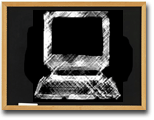

|
Using Computers in Education National Endowment for the Humanities Preps Schools for New Millennium By William R. Ferris While the technology is out there, schools are still figuring out how to use it effectively and wisely. The good news, according to a recent study, is that Internet access in public schools increased from 35 to 78 percent over the last four years. The bad news is that there is no systematic, nationwide plan to show teachers the wealth of instructional materials available by computer and how to use them in their day-to-day teaching. More than 90 percent of the nationís teachers believe that using the Internet boosts student achievement, but 60 percent of the teachers want help in using the computer for instructional purposes. Schools for a New Millennium The National Endowment for the Humanities (NEH) is addressing that need. Through a new initiative called "Schools for a New Millennium," NEH has awarded grants to 20 schools nationwide to develop them into models of how to use computer technology to enrich teaching of the humanities. At these schools, teachers are working with consultants to integrate high-tech resources, including computers, CDs, cable TV and more, into the humanities curriculum. Each of the 20 schools has its own special emphasis. Teachers at Booker T. Washington High School in Memphis, Tenn., for example, have their students researching the Internetís resources on the civil rights movement, using that information to do oral history interviews with local folks who lived through that period, and posting their interviews electronically for anyone to access. Bullard High School in Fresno, Calif., is overhauling its humanities curriculum, including schoolwide training for teachers in the resources of the Internet and weaving of those resources into the lesson plans for teaching Californiaís immigrant experience and Hispanic culture. The Frontier Regional Middle and High School in Deerfield, Mass., is forming a three-way partnership with the University of Massachusetts at Amherst and a local museum, which has 31,000 objects documenting the history of western Massachusetts, to put museum material on a Web site so it can be used by the school. NEH has funded similar projects at schools in Arizona, Hawaii, Kansas, Maryland, Minnesota, New Hampshire, New Jersey, New Mexico, New York, Texas, Washington and Wisconsin. We are committed to developing the use of the computer as a major educational tool in the humanities, and we will be announcing more grants to develop additional Millennium Schools this summer. The computer cannot replace the close study of texts that lies at the heart of humanities education, but computer-accessible teaching aids can support teachers in ways that help students learn and boost their achievement. It is exciting to know that NEHís Millennium Schools, through their efforts today, will become tomorrowís exemplars of excellence in the educational use of information technology. NEH Also Maintains EDSITEment NEH maintains EDSITEment, a gateway Web site http://edsitement.neh.gov that provides links to 49 sites carefully selected for their quality of educational content and design. Instead of having to sift through more than 65,000 humanities-related sites on the Web, anyone seeking the best humanities education materials on the Internet can easily find and access them through EDSITEment. Each site comes with lesson plans offering suggestions on how to use the materials effectively in the classroom. For More Information For more information, call NEH at (202) 606-8671. About the Author William R. Ferris is chairman of the National Endowment for the Humanities. |
 Computers
are often praised as educational miracle workers, as cures for whatever
ails Americaís classrooms. If only it were that simple.
Computers
are often praised as educational miracle workers, as cures for whatever
ails Americaís classrooms. If only it were that simple.